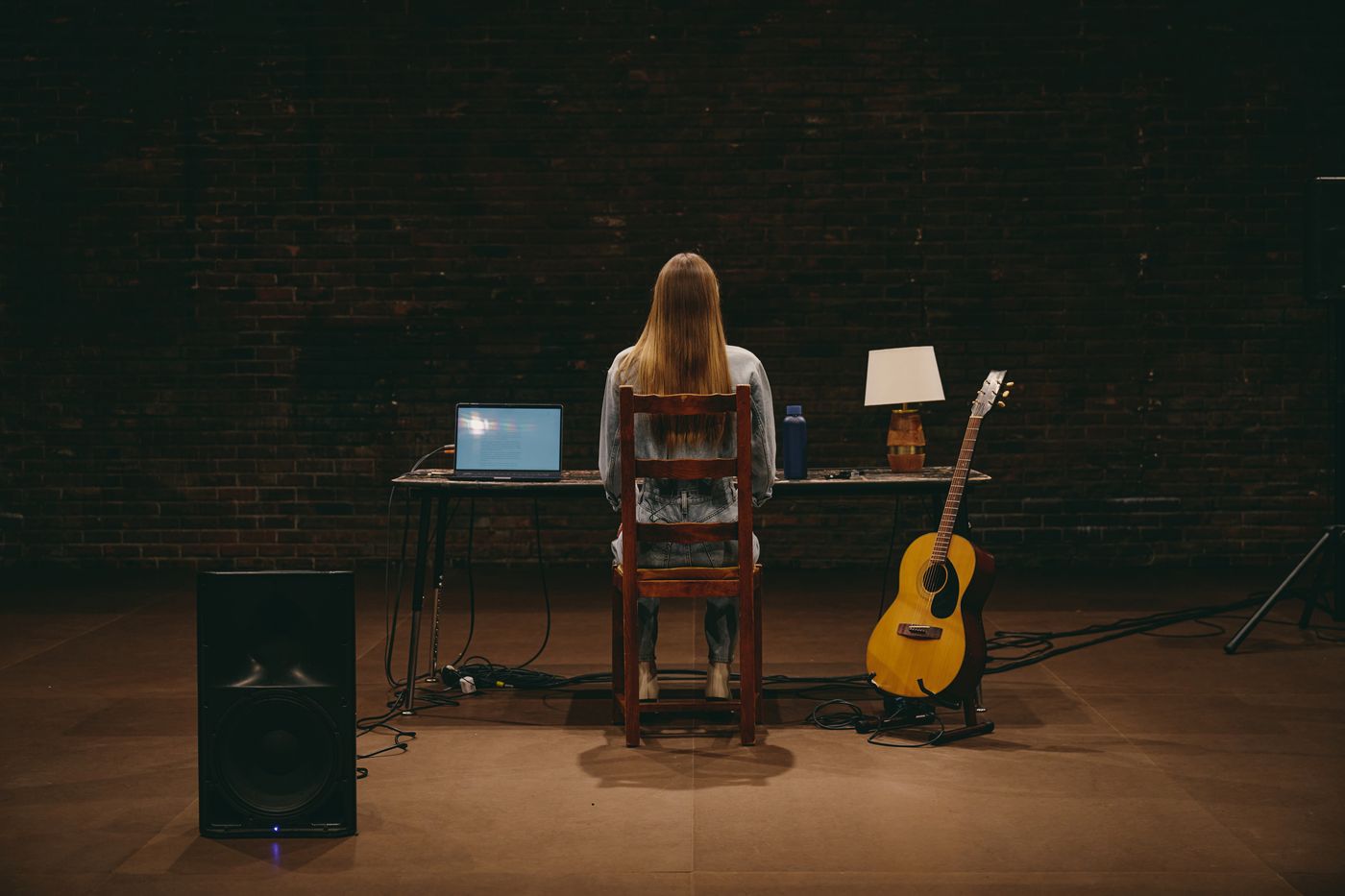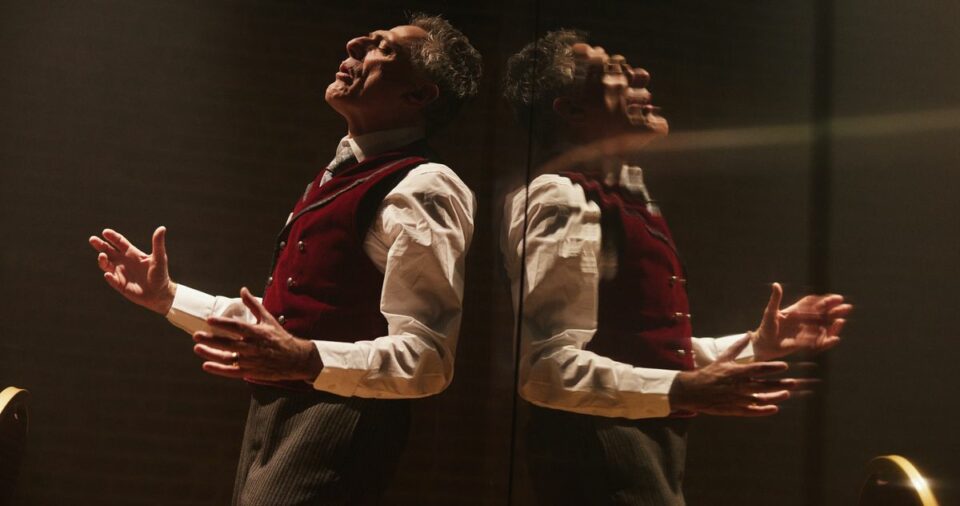As exhilarating as solo shows can be, it’s hard not to fret over their current ubiquity. Our theater-making climate is, more and more aggressively, demanding ultra-spare performances. Even in the U.K.—a real place weathering its own political storms, but also, for so long, a comparative ideal of national-arts funding in the eyes of American artists—renowned venues like the Royal Court are seeing their budgets slashed and burned so mercilessly that they’re programming whole seasons of stand-up comedy. (No hate toward stand-up, but what happens when theaters like the one that nurtured Caryl Churchill and Sarah Kane get a sledgehammer to the knees?) The upside, chilly comfort though it may be, is what the upside always is for the arts in times of crisis: ingenuity, imagination, scrappiness — along with, if we’re really lucky, a clarity of intention and a turn towards generosity, resource-sharing, and a spirit of mutuality.
Right now, at both New York Theatre Workshop and in the tiny yet mighty Williamsburg venue tfahe Brick, there is a solo performance occuring around a table on an otherwise empty stage. But there the similarities end: While On Set With Theda Bara—at the Brick, written by Joey Merlo and performed by off-kilter-theater royalty David Greenspan—embodies exactly the kind of gutsy weirdness and rich, invigorating audience connection that can arise from the challenge of a limited set of tools, Mona Pirnot’s I Love You So Much I Could Die is a closed, solipsistic box. It’s so steeped in nonfictional suffering that it practically dares us to remain unmoved: How could anyone be so heartless? But it’s this very tone—a frustrating, inward-folding fixation on pain as both content and craft—that can lead even the most sympathetic of hearts toward grinchiness.
Pirnot is married to her director, the playwright Lucas Hnath (his plays, she notes in the show, were “hard to get ahold of” when they first met, but “he would later become quite famous”). The production, their first professional collaboration, often feels like a mournful valentine to him (even down to its opening date). Its central hinge—arriving a little over halfway through the piece’s slim yet lugubrious 65 minutes—is the title song, in which Pirnot accompanies herself quietly on guitar and sings about how, in her darkest moments, Hnath has picked her up off the floor, how he’s gotten thinner and grayer as they’ve weathered tragedy together, and about his gentle efforts to “get [her] out of [her] head.” I Love You So Much is a collection of personal stories, alternating with songs, all written by Pirnot, and all stemming from her experience in the wake of a terrible event: At the beginning of the pandemic, as she and Hnath were sheltering in place, Pirnot’s sister was incapacitated. We aren’t told exactly what happened, but we learn that Pirnot and Hnath spent six months with her family in Florida, in and out of hospitals at the most dangerous and chaotic time, caring for a loved one who wasn’t going to make a full recovery.
The bare facts of what Pirnot and her family have gone through, and are still going through, are heartbreaking. Material like this comes with a detonator attached; handle it indelicately and it feels like it might explode, because, after all, it’s not just “material” — it’s someone’s life. But no matter how sensitive we long to be, the truth is not automatically art. And Pirnot’s particular way of theatricalizing what’s true doesn’t elevate it or crack it open for us. In fact, it hardly seems to require our presence.
Not once in I Love You So Much do we see Pirnot’s face. In the middle of the stripped-out stage at NYTW (a wide brick box, gorgeous as its naked self), she sits at a table with her back to us, a laptop on one side, a guitar and lamp on the other. The stories she has to tell are delivered by the computer — her words spoken in the flat, slightly wonky cadence of a Microsoft text-to-speech tool. We can watch the cursor blink its way across the screen as the contourless male voice stumbles over pronouncing “Shia LaBeouf” and details episodes of crushing depression. This overwhelming sorrow, we’re given to understand, is why the computer is speaking to us in the first place. As Pirnot explained to Michael Paulson in the Times, when she “couldn’t find the strength to verbalize her feelings to [Hnath] or her therapist … she typed her thoughts into her laptop, and prompted a text-to-speech program to voice them aloud.”

That implies that Pirnot never faces us because she literally can’t. It’s simply too emotionally difficult. Yet in choosing to keep herself protected, her voice disembodied, she sours—indeed, nearly severs—her show’s connection with the audience. If we were all to sneak silently out of the theater, would she notice? Would it change the essence of her project? Who is all of this for? Despite Hnath’s proven interest (sometimes, I’ve been told, wildly effective) in recorded and mediated voices on stage, there’s a troubling coyness about what he and Pirnot are engaged in here, and it undermines both the devastation and the complexity she’s attempting to communicate. I could feel myself becoming vexed and uncharitable, a terrible way to feel in the face of real suffering. The issue, though, is not the suffering but the container that’s been built for it, which is little more than a diary. Even if writing it was a healing exercise, it’s not generous enough, vivid enough, or ambiguous enough to transform itself into a true creature of the stage. Theater can be therapeutic, but therapy-as-theater doesn’t get a pass, based on its emotional tonnage alone.
Joey Merlo’s cunning, captivating On Set With Theda Bara first lit its murky lights at the Brick a year ago — and now, in a heartening example of institutional collaboration, the Transport Group and the Lucille Lortel Theatre have pitched in as presenters to bring it back for an encore performance. Again, we’re in a brick box, stripped to its bare walls. Again, there’s a table in the center, this time covered in a black cloth and stretching almost the length of the room. A first row of audience sits around it, another in higher seats around the periphery of the space. Above it hangs a row of lamps, the kind that swing over desks in messy, smoke-stained film noir offices, where tough guys in suspenders await trouble in the form of leggy dames with mysterious backstories and full wallets.
Merlo and his director, Jack Serio—who himself is working hard on ubiquity—dive straight into the delicious sea of high camp and long shadows that noir provides. Serio has a flair for the literal dark, and here, he and his excellent lighting designer, Stacey Derosier (also responsible for the sexy candlelight scene in that Uncle Vanya you might have heard of) use both those hanging lamps and the caged safety lights on the theater’s walls to wonderful effect. When the inimitable David Greenspan stands below the latter, features etched in the top-down glow as he leans against the bricks nursing an invisible cigarette, you could swear real smoke is curling from his fingers. There’s no melancholy muted trumpet whining in the air, but you hear one all the same.
On Set With Theda Bara is a solo performer’s fever dream, and Greenspan—a six-time Obie winner and a nonpareil of the extended soliloquy—steps into its bejeweled slippers with virtuosic ease. As he stalks, glides, and frolics around (and on top of) the table, he unfolds a shifting, uncanny story for four voices, a skin-prickling quartet that’s delightfully queer in more ways than one. Sometimes, he’s Theda herself — famous “vamp” of the silent film era, a luminous, ominous presence in more than 40 films (renowned for her Cleopatra), mostly unseen today because the bulk of of her work was destroyed in a fire in 1937. Sometimes, he’s a determined genderqueer teenager named Iras (“How perfect, how divine,” coos Theda, “Like Cleopatra’s handmaiden”), whose obsession with Theda has led them to run away from home and to stumble upon a towering, decrepit mansion that seems to belong to the great actress. (“Which would make you,” says starry-eyed Iras to their host, “139 years old.”) Greenspan’s elastic voice and ceaselessly expressive hands also turn him into Ulysses—a church organist from the Faulkner south whose fanatical devotion to Theda led him, like Iras, straight to her door—and into Detective Finale, Iras’s gumshoe father who’s on the case of their disappearance.
How many of these characters are “real,” or if they exist as a kind of psychological matryoshka, is a question Merlo leaves wrapped in plumes of cigarette smoke — or perhaps in whorls of movie-set fog. The delight of On Set With Theda Bara doesn’t lie in trying to flip the light on and assemble its various pieces in orderly fashion. That would do a violence to the dimly lit magic of the world where Theda—like Blanche DuBois and a host of queer queens before and after her—resides. Rather, the show’s real thrill exists in its alchemy of atmosphere and performance, which is by turns haunting; aching with overcharged, Norma Desmond–ish ennui; and refreshingly funny. “Last year she wanted to be called ‘they’,” Finale tells us about Iras, shrugging with parental befuddlement. “I still don’t get it. And I’m very liberal! … When we took out that Missing Person ad in the paper I said she was a she. She’ll hate that. But this is an emergency! … People might get confused. If I said ‘they’—well—people might think there are two kids missing.”
The fact that Finale is gay (he and his husband “always wanted a little girl” he says), but can’t quite wrap his head around “genderqueer” is characteristic of the play’s bittersweet little bursts of emotional realism amidst its broader flow of crepuscular mystery. Greenspan is a master of height with heart: He’s never not stylized—his long fingers are never not placed just so—but his modulations are those of a dancer. He doesn’t do natural, but he does do rooted, and deeply so. He moves us through specificity and grace, an abundance of craft that runs hot and joyous, not cold. The circular flow of energy in the room is palpable, almost visible: It pours out of Greenspan, crackles through us, and flows back into him, powering him like a human battery. At times, he emits the same wondrous, diabolical force as a silent movie Dr. Frankenstein, shouting gleefully via title card, “It’s alive!”
Even though Greenspan both feeds on and gives back to the audience, Merlo is fascinated by the place at which that electric, sustaining flow starts to short circuit, tipping out of balance toward something sinister. The word “vamp” derives from “vampire,” and at the dark, soft heart of On Set With Theda Bara is a contemplation of the ways in which we create our own idols and our own monsters. Does a woman become a vamp because she feeds on men, on her fans, on anyone that crosses her path? Or because everyone who’s crossed her path has been a kind of parasite — forcing themselves and their adoration upon her, crawling inside her and reshaping her in the desired image, from her name to her kohl-rimmed eyes? What does it mean when a version of you that’s not you achieves immortality? Who’s draining whose blood? As Theda Bara builds to its theatrical coup, it provides no solid answers. Nothing is solid here, in this room of mirrors and shadows, but everything is more exciting in the dark.
I Love You So Much I Could Die is at New York Theatre Workshop through March 9.
On Set With Theda Bara is at the Brick through March 9.
Related
- Theater Review: In ‘Strange Interlude,’ One Man, 6 Hours, Many Ghosts
- Dana H. Is Harrowing and Unmissable
Sara Holdren , 2024-02-15 02:40:36
Source link


